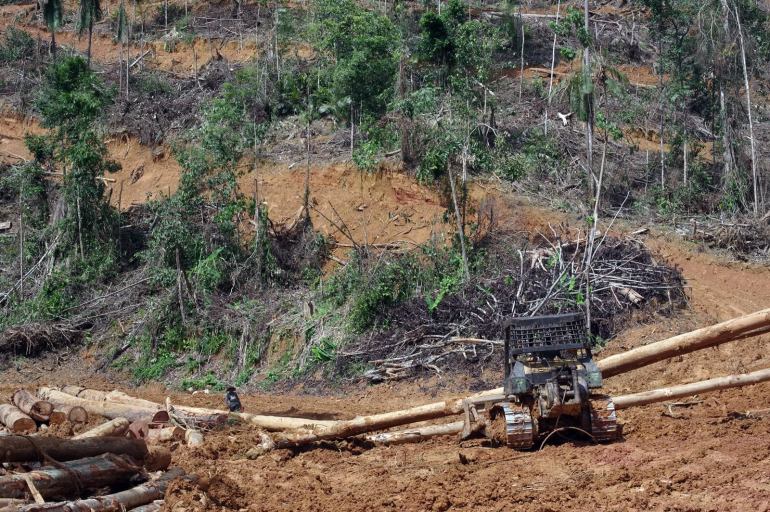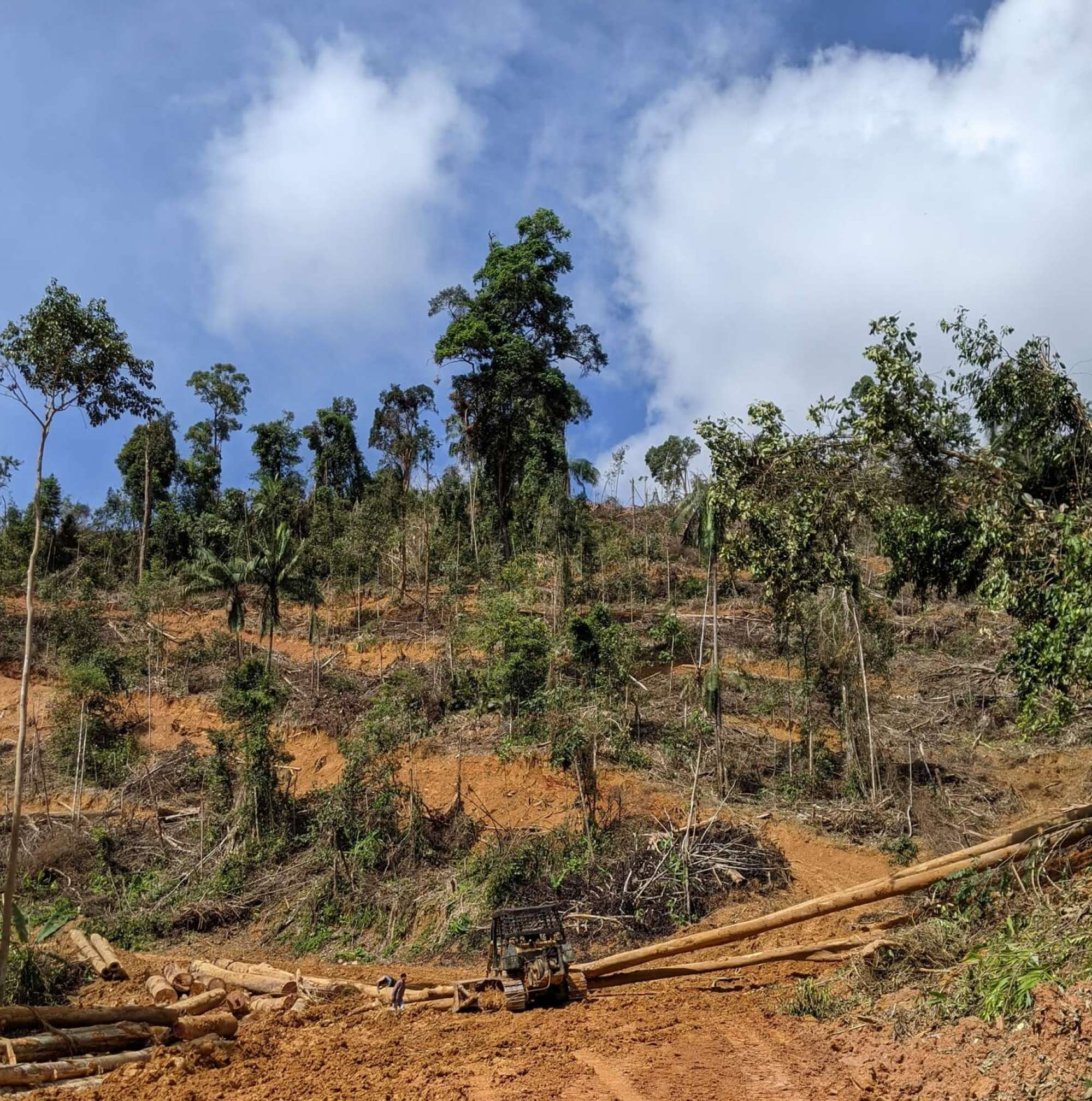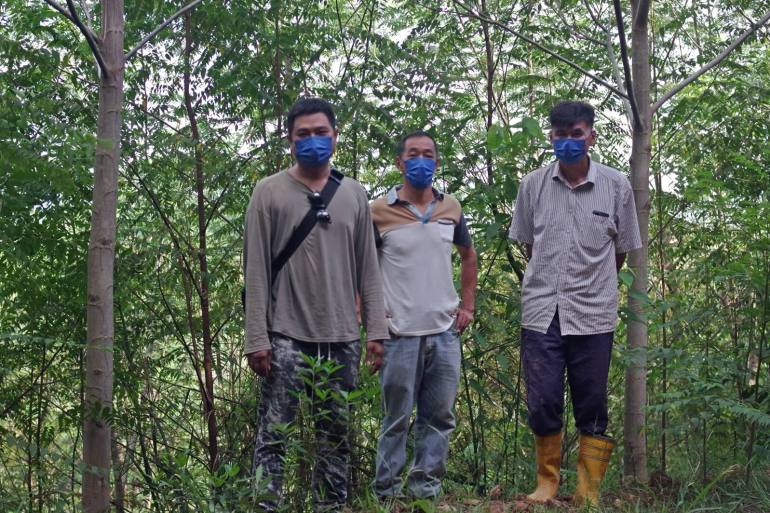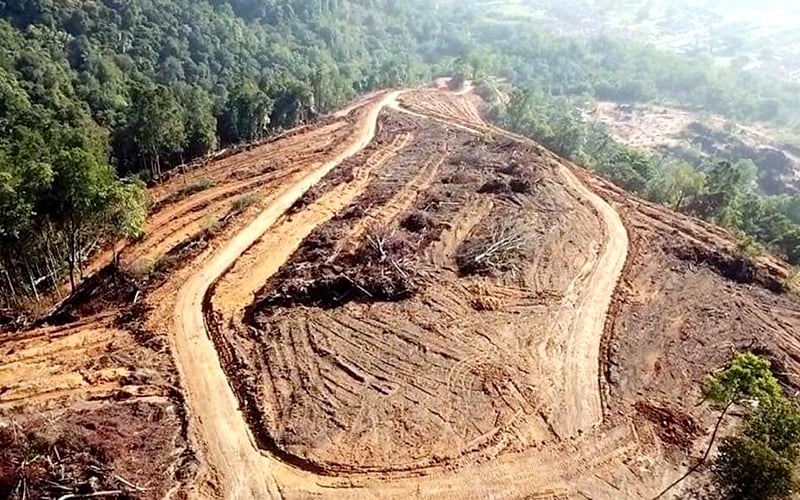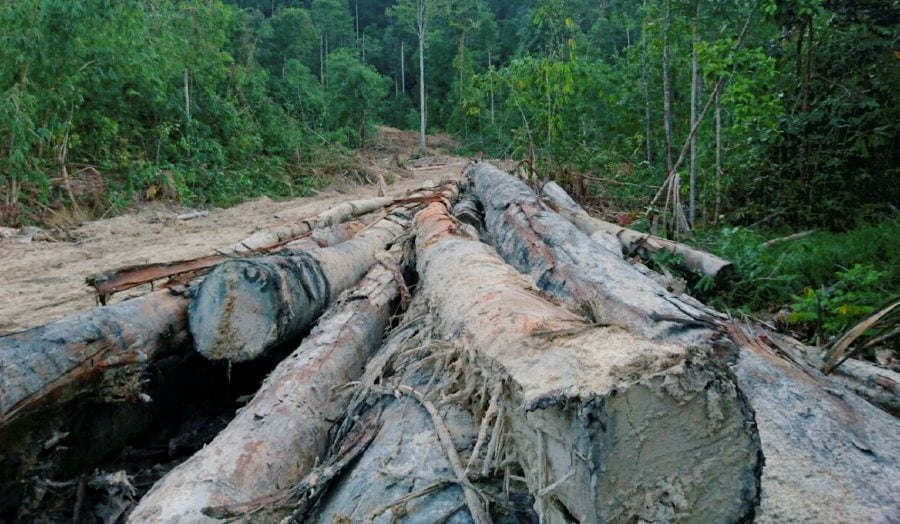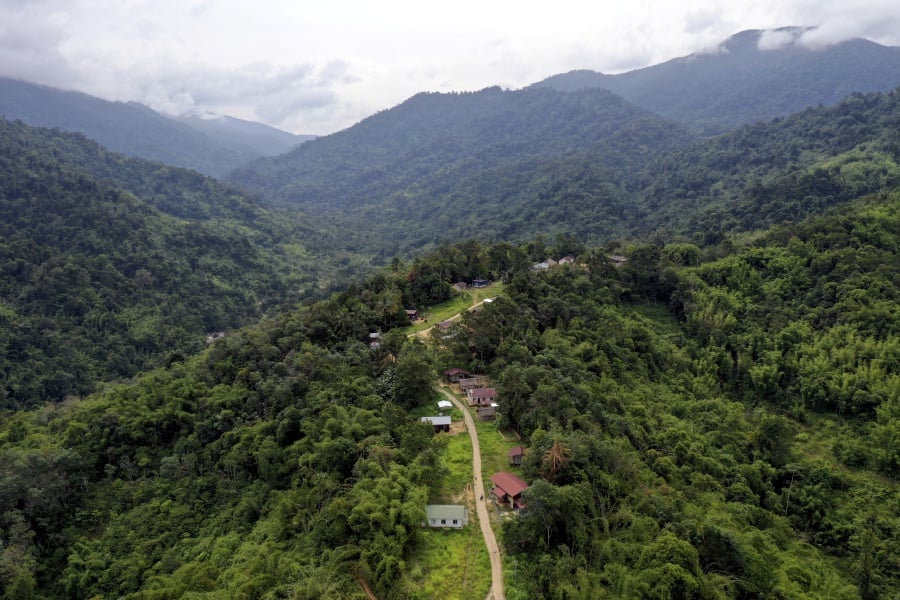- hot-spots
- deforestation
- Malaysia
- Deforestation in Malaysia

Problems
An environmental disaster over forest plantations in Malaysia
For decades, a hotspot of deforestation of plantations has been unfolding in Malaysia. Critics claim that logging thousands of hectares of natural forest has destroyed critical habitats in one of the world's most biodiverse countries. According to scientists, rare, endangered, and threatened species will almost certainly be missing from forest plantations if logging continues at this rate. Experts also noted that forest plantations, especially those that cultivate exotic species, will result in a homogeneous or simplified habitat that can support only a limited number of fauna and flora species. In addition, deforestation hinders Malaysia's commitment to reduce greenhouse gas emissions by 45% by 2030 under the Paris Agreement.
The economic benefits of logging
Malaysia has received a significant financial benefit from its logging industry. According to statistics, this benefit is estimated at $2,150,000,000. Together with neighboring Indonesia, Malaysia produces 85% of the world's palm oil supply, which is the main reason for logging. In addition, the agricultural sector accounts for 14.5% of the labor force, more than 1 in 7 people. 56.6% of Malaysia's tropical forests are used for production.
The consequences of plantation deforestation
The effects of deforestation in Malaysia have touched not only the environment but also the local people. Some of the most global consequences of human interference in Malaysia's ecology include: ● Malaysia ranks 21st in the world for biodiversity with 2,199 endemic species. 18% of these species are listed as "endangered" because they are endemic, if Malaysia fails to conserve them, it will lead to their extinction. ● The indigenous peoples of Malaysia have always depended on the rainforest for medicine, shelter, food, and more. They have been known not to take more than they need because it would be seen as a violation of the forest and would bring curses upon their people. The destruction of their primary resource leads to the destruction of their traditional way of life. As the forest disappears, so does their culture. ● Runoff has also increased. While we should not immediately suspect that logging deep in the jungle might affect a small city on the coast, because there are fewer forested areas to soak up rainwater and act as a slow-discharge reservoir, flash floods do occur and are becoming more and more frequent. ● An increase in landslides has been reported.
Conservation Efforts
In Malaysia, the World Bank estimates that trees are being cut at four times the rate of sustainable logging. Logging should not be as destructive as it is now in Malaysia, as it leads to irreversible consequences. Over the past two decades, Malaysia has diversified its economy, but logging still attracts many because of poor regulation and high profits. The most effective way to deal with the negative effects of logging is through stricter regulation, which still allows palm oil to be produced in large quantities, but in a more sustainable way. In this way, not only would the impact on Malay biodiversity be mitigated, but there would also be more forests to cut down, and thus profits to be made in the future. Increased awareness among Malaysians, combined with local indigenous folk beliefs, has come from the many Malaysian environmental movements. The Malaysian Society for Nature actively advocates for the protection of forests. Other organizations such as Tabung Alam Malaysia, an affiliate of the World Wildlife Fund, have also opened offices in Malaysia since 1972, dedicated to conservation as well as educating the general public about the importance of forest conservation. The Institute of Forestry Research Malaysia is also active in researching the biodiversity of Malaysia's forests as well as undertaking conservation activities.
Gallery
9Timelines
2023
November 08
Malaysia urged the EU to recognize and appreciate the efforts of palm oil-producing countries in meeting the EU Deforestation-free Regulation (EUDR), state news agency Bernama reported. Addressing the Malaysian Palm Oil Board (MPOB) International Palm Oil Congress and Exhibition (PIPOC 2023) in Kuala Lumpur, Prime Minister Anwar Ibrahim said palm oil producing countries such as Malaysia, Indonesia and Thailand have taken aggressive measures to comply with the regulation. “In the desire to continue with this reduction in carbon emissions, (they need) to take into consideration all the problems of the emerging economies,” he added. Malaysian agro-commodity products, primarily palm oil, timber, cocoa, and rubber exports, will be subject to the EUDR, which is expected to take effect from January 2025. Under the regulation, any operator or trader who places commodities such as soy, beef, palm oil, wood, cocoa, coffee, or rubber on the EU market, or exports from it, must be able to prove that the products do not originate from recently deforested land or have contributed to forest degradation.
March
Environmental group RimbaWatch, in a statement, estimated that Malaysia's forest cover could decrease to 15,636,737 ha or 47 percent of the total land area in the future. This number is below Malaysia's commitment to maintain 50 percent of its land as forest cover. Rimbawatch, through its study titled "State of the Malaysian Rainforest 2023″, said it had collated and analyzed data on past and potential future deforestation, and concluded that Malaysia had deforested 349,244 ha between 2017 to 2021. Sarawak and Pahang, it said, experienced the highest rates of deforestation. Moving forward, it suggested that government place a legally-binding moratorium on all forest clearing until issues could be addressed, gazette all indigenous customary territories and abolish all timber plantation programs and ensure 30 percent of the total land area is in totally protected forest areas. "The private sector is urged to accept that deforestation and sustainability are mutually exclusive, and to reject any involvement in activities involving deforestation and violations of community rights," it said.
2022
July 26
Between 2007 and 2021, the federal government loaned planters about 1.05 billion ringgit ($238 million), and state governments, which control the land, gave forestry companies 66-year concessions. As a result, about 6.1 percent of the peninsula's forest reserves have been licensed for logging, mostly rubber, popular with furniture makers, but also other non-native species such as acacia and eucalyptus. The ecological effects of deforestation are already being felt, although the plantations themselves have yet to yield significant economic benefits. Most logging in Malaysia's forest reserves since the 1980s has been selective, with loggers cutting only a limited number of large trees. But plantation forest operators have taken a very different approach - removing every tree to plant the entire plot with a single species of tree. Clearing these areas for forest plantations has coincided with significant carbon emissions over the past 20 years, as evidenced by greenhouse gas inventory analysis and tree losses. According to forest ecologist Badrul, monoculture forest plantations can affect biodiversity in the same way that oil palm plantations do. Studies in Malaysia have shown that monoculture plantations "deplete biodiversity," and such homogeneous habitats "are unlikely to support most forest-dependent species across all animal and plant taxa," Badrul said.
2020
November 09
In the Malaysian state of Sabah on Borneo Island, a small NGO is reforesting land that was once a legal oil palm plantation, essentially turning back the clock for a small plot of land that will connect two large conservation areas when the project is completed. The Rhino and Forest Foundation (RFF) says the 800-meter (2,600-foot) growing wildlife corridor will benefit numerous endangered species, including Bornean elephants, storks, and possibly the world's largest population of Bornean banteng, a species of wild cattle. "Our project is probably the first time that private oil palm land has been bought back for protection and restoration," says Robert Risch, executive director of the RFF, who notes that while oil palm plantations have reforested before, it has usually involved reforestation of illegally grown plantations, not legal plantations that have been bought back. RFF purchased 65 hectares (160 acres) of land through donations to complete the project: 50 hectares (124 acres) are oil palm plantations and the rest is forest. As a foreign NGO operating in Malaysia, the RFF cannot legally own land, so, according to Rish, it has "established a new procedure for acquiring and protecting private land in Sabah."
2019
February 14
Sarawak's most famous tourist attraction, the UNESCO-protected Mulu National Park, is threatened by large-scale oil palm development in its immediate vicinity. The Malaysian company Radiant Lagoon Sdn Bhd has already begun logging a 4,400-hectare oil palm plantation in the Mulu forest, which will negatively impact the wildlife corridor between the Mulu National Park and Brunei primary forests. The Bruno Mansera Foundation calls on the Malaysian and Sarawak state governments to immediately stop logging for the planned plantation. "Malaysia has pledged to the international community to stop logging for new oil palm plantations," said Lucas Straumann, executive director of the Bruno Mansera Foundation. "This is a clear case of environmental disaster. The credibility of the Malaysian government and the country's palm industry is at stake." Last month, indigenous residents of the three affected communities of Berawan and Penan protested the planned plantation in a letter to Sarawak Chief Minister Abang Johari. The letter was signed by 268 villagers from Batu Bungan, Long Therawan, and Kampgun Melinau, who were not consulted about the plantations. The authorities did not respond to the letter.
2018
March 19
A report published on Feb. 8 in the journal Biological Conservation found that oil palm plantations along the Kinabatangan River in the Malaysian state of Sabah are dominated by a variety of non-conservationally important terrestrial frog species. Meanwhile, forested areas were found to support more species of frogs. But in forests adjacent to plantations, species richness declined, indicating so-called edge effects from plantations. Boundary effects describe changes in species diversity that occur at habitat boundaries and can be pronounced when habitat structure changes dramatically between two different types of ecosystems. Scientists working on the paper studied 74 sites — 39 lowland rainforests and 34 plantations — along the Kinabatangan River. The researchers also described 11 Borneo-endemic species of frogs, most of which are found in forests. "These new findings suggest that for small patches of forest or narrow corridors to have long-term conservation value in oil palm landscapes, their size and width must properly account for the significant impact of edge effects," Benoit Goossens, Director Danau Field Center Girang in Sabah, who participated in the study, the statement said. The Sabah state government is committed to protecting 30 percent of its forest land and has managed to protect 26 percent to date. Goossens said oil palm operators should also put more effort into conservation, given that most plantations in Sabah are located in areas important to many species. The study found "strong indirect edge effects over decades" in forests more than a kilometer (0.6 miles) from oil palm plantations, "suggesting that the true global ecological footprint of human food production has been significantly underestimated."
2015
November 19
Satellite images show that BLD Plantation Bhd has cleared 900 hectares of forest since June 2015. The permitted logging contradicts a pledge by Sarawak's chief minister to help preserve Malaysia's remaining forests. Local and international environmental activists allege that BLD Plantation Bhd, a Malaysian palm oil company with poor sustainability records, has been relentlessly logging the peat-rich land it owns in the vulnerable and often exploited state of Sarawak. Satellite images provided to Mongabay by Friends of Orangutans (FOTO Malaysia) show the company significantly accelerating its destructive operations in the Lassa Land District concession located in Sibu, Sarawak. BLD is believed to have deforested about 10,600 hectares of the 20,466 hectares since obtaining the lease in 2000, and new data and images show that the company continued to cut down about 11 hectares a day between June 30 and September 18 this year, or more than 900 hectares in two and a half months. The rampant deforestation in BLD was one of the topics discussed in October at a meeting of Sarawak Chief Minister Tan Sri Adenan with a coalition of activists and professional NGOs, including FOTO Malaysia, Center for International Policy (CIP), Borneo Resource Institute (Brimas) and Sarawak. Dayak Iban Association (SATIA), among others. The group sought to urge Adenan, praised for his willingness to address and acknowledge the alarming situation in the state's forestry sector, to pursue more sustainable initiatives in Sarawak. This discussion focused on the BLD's plans to expand its operations. "We are inspired by your words, 'We should all look at forests as naturalists, not just as a source of dollars,'" the NGOs wrote in a letter to Adenan after the meeting. "Of course, as you said, it's not the commitments that matter, it's the implementation."
2013
November 15
Malaysia had the world's highest rate of forest loss between 2000 and 2012, according to a new global forest map developed in partnership with Google. During this period, total forest loss in Malaysia was 14.4 percent of the 2000 forest cover. The loss is 47,278 square kilometers (18,244 sq mi), which is larger than the area of Denmark. Forest loss in Malaysia was partially offset by an increase in vegetation cover of 25,978 sq. km. During this period, the oil palm area in Malaysia increased by about 50 percent or 17,000 square kilometers. Dan Zarin, program director of the Climate and Land Use Alliance, an association of philanthropic foundations, says swapping natural forests for planted forests is a net loss for the planet. "You can't 'counteract' deforestation by planting trees," Zarin said, "because newly planted forests are much less valuable for carbon, biodiversity, and the people who depend on forests than existing native forests."

